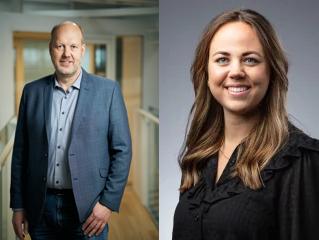New technology based on artificial intelligence can detect cancer earlier than standard methods
Researchers from Aarhus University have contributed to developing a new technology that uses artificial intelligence to detect even very small amounts of cancer DNA in blood samples. This paves the way for earlier and more precise treatment of patients.

Researchers from Aarhus University and Aarhus University Hospital have helped develop a revolutionary technology that, using artificial intelligence, can detect even the smallest amounts of cancer DNA in blood samples.
According to the researchers, the technology can pave the way for earlier and more precise treatment of cancer patients.
The new technology is based on an artificial intelligence algorithm that can distinguish between normal DNA and cancer DNA in a blood sample filled with millions of DNA fragments.
The algorithm is capable of quickly and efficiently scanning these fragments to identify cancer DNA, making the technology more sensitive and accurate than previous methods.
Can detect smaller tumors than before
The study, recently published in the journal Nature Medicine, shows that the technology can find cancer DNA in blood samples from patients with various types of cancer, including lung cancer, malignant melanoma, breast cancer, colon cancer, and precancerous conditions of the colon.
"With the new technology, we achieve a remarkable signal-to-noise improvement, allowing us to detect cancer recurrence months or even years before standard clinical methods," says Professor Claus Lindbjerg Andersen from Aarhus University and Aarhus University Hospital.
The improved sensitivity of the new technology means that researchers can identify cancer DNA in the blood with much smaller tumors than before.
"This is significant because it shows that it is theoretically possible to use blood samples to screen for precancerous conditions and thus potentially prevent them from developing into cancer," explains Amanda Frydendahl, postdoc at the Department of Clinical Medicine at Aarhus University and the Department of Molecular Medicine at Aarhus University Hospital and co-first author of the study.
Applicable to different types of cancer
Unlike other technologies that focus on single cancer DNA changes, the new technology utilizes the entire genome, significantly increasing sensitivity and efficiency.
This versatility makes the technology applicable across different types of cancer and patients without needing to customize the analyses individually.
"The broad usability of the technology makes implementation in the clinic easier," says Amanda Frydendahl.
The researchers have demonstrated that the new technology can identify signs of cancer recurrence several months, and in some cases years, before it is detected by traditional methods such as scans.
Early diagnosis is crucial for many patients, emphasizes Amanda Frydendahl.
"The sooner we can identify residual disease, the better we can tailor the treatment and increase the chances of a cure," she says.
About the research results
Study Type: Experimental research study
Collaborators: Postdoc, MD Adam Widman and Professor Daniel Landau from Weill Cornell Medicine, the New York Genome Center, and Memorial Sloan Kettering Cancer Center in New York, USA
External funding: Novo Nordisk Foundation, Danish Cancer Society
Link to the scientific article: https://www.nature.com/articles/s41591-024-03040-4
Contacts:
Professor Claus Lindbjerg Andersen
Aarhus University, Department of Clinical Medicine and
Aarhus University Hospital, Department of Molecular Medicine
Mobile: +45 2980 4321
Email: cla@clin.au.dk
Postdoc Amanda Frydendahl
Aarhus University, Department of Clinical Medicine and
Aarhus University Hospital, Department of Molecular Medicine
Mobile: +45 5365 8769
Email: amandafbj@clin.au.dk